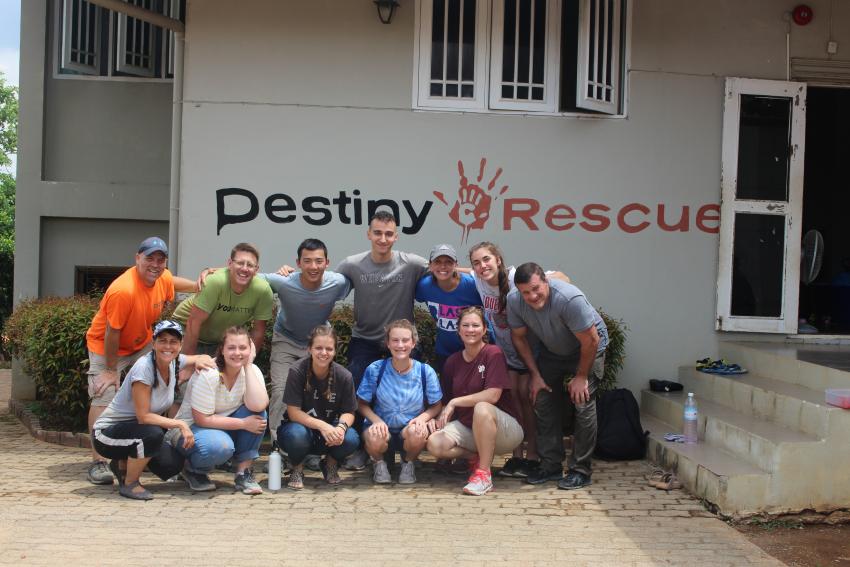Rehabilitation, Art, and Hope: Paskell ’81, ’96MEd Volunteers with Survivors of Sexual Exploitation

Linda Ruth Paskell with her team at Destiny Rescue in Thailand
By Caitlin Joyce ’20
An estimated 15 million adolescent girls have been sexually exploited worldwide, according to The United Nations Children’s Fund (UNICEF). Organizations around the world, such as Destiny Rescue, help to retrieve and protect children who are trapped in the global sex trading industry.
Adjunct Professor of Education Linda Ruth Paskell ’81, ’96MEd spent two weeks this past summer offering services in Thailand and Cambodia. The services Paskell assisted in ranged from art therapy opportunities, such as jewelry and mural making for survivors, to teaching an English class to high school students. Additionally, Paskell and her team members helped install a new cement driveway at a group home.
Many of the victims saved by Destiny Rescue were encouraged to work in the trafficking industry by their parents, driven by severe poverty to acquire a means of income. Destiny Rescue, which has rescued more than 4,000 victims through trafficking raids, provides survivors with the opportunity for vocational training with jobs that include working at Chiang Rai’s Destiny Cafe and Restaurant, owned and operated by survivors.
“It was a privilege to work alongside an organization that provides so many opportunities for restoration, healing, and hope,” said Paskell. “While walking through the red light district, the evil was palpable, and the fear in these young women’s eyes was undeniable. Yet, the hope that we saw in the eyes of those who had been rescued and given the opportunity to reach for their dreams is what we are all working toward.”
This is one of many mission trips Paskell has taken as a photojournalist over the last 12 years. She documents her work through the “The Color of Poverty,” an ongoing reflection of the impact of global poverty and usage of the arts in locations throughout Africa, South America, Central America, and South Asia thus far. Despite the human suffering she has witnessed on her mission trips—including a firsthand encounter with the brutality children face in trafficking entrapments—Paskell retains a positive attitude, crediting her faith for giving her strength and resolve to continue her work.
“I still believe in kindness and hope,” said Paskell. “I dare to believe in the best in people, as we all have something to learn from one another.”
Despite language barriers, Paskell found that human connection and communication is fluid when it comes from the heart. At Arcadia, she relays her passion for service through the University’s “Artists in the Community” course, which encourages students to connect with underserved individuals in the area through community art making.
“I’m here to motivate, educate, and serve,” said Paskell. “Love is the key. My life motto: Aspire to inspire before you expire.”


